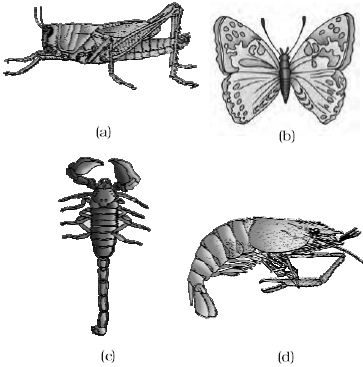Phylum Arthropoda is the largest phylum of Animalia which includes insects. Over two-thirds of all named species on earth are arthropods (Figure). They have organ-system level of organization. They are bilaterally symmetrical, triploblastic, segmented and coelomate animals. The body of arthropods is covered by chitinous exoskeleton. The body consists of head, thorax and abdomen. They have jointed appendages (arthros-joint, poda-appendages).

Fig: (a) locust, (b) Butterfly, (c) Scorpion, (d) Prawn
Respiratory organs are gills, book gills, book lungs or tracheal system. Circulatory system is of open type. Sensory organs like antennae, eyes (compound and simple), statocysts or balance organs are present. Excretion takes place through malpighian tubules. They are mostly dioecious. Fertilization is usually internal. They are mostly oviparous. Development may be direct or indirect.
Examples: Economically important insects – Apis (Honey bee), Bombyx (Silkworm), Laccifer (Lac insect), Vectors – Anopheles, Cutex and Aedes (Mosquitoes), Gregarious pest – Locusta (Locust) Living fossil – Limulus (King crab).










